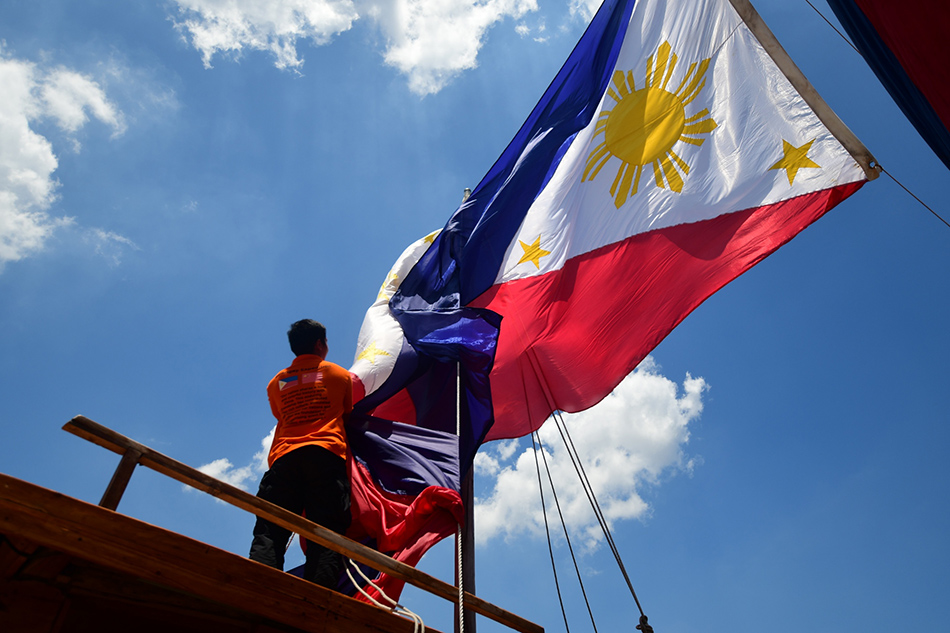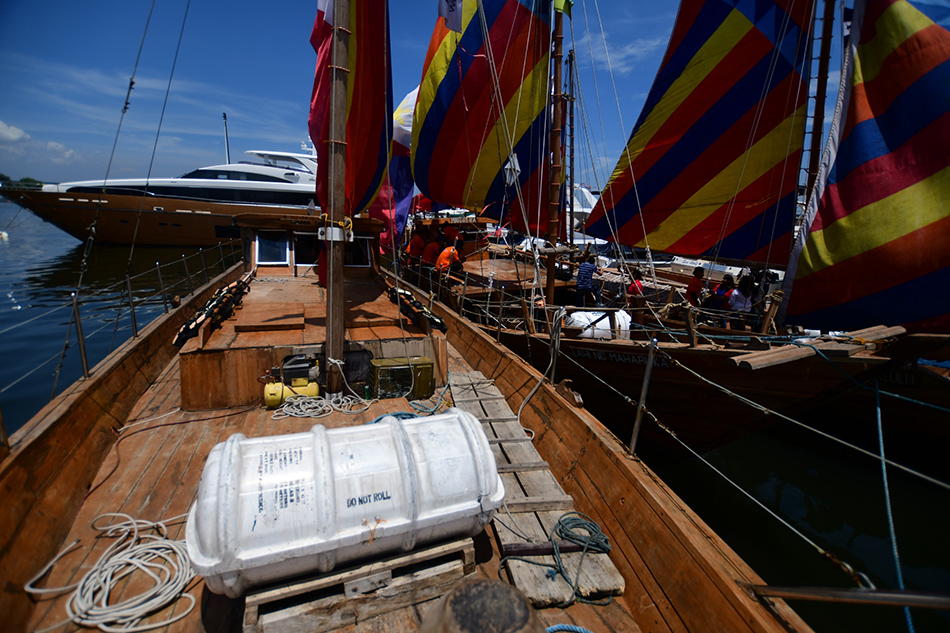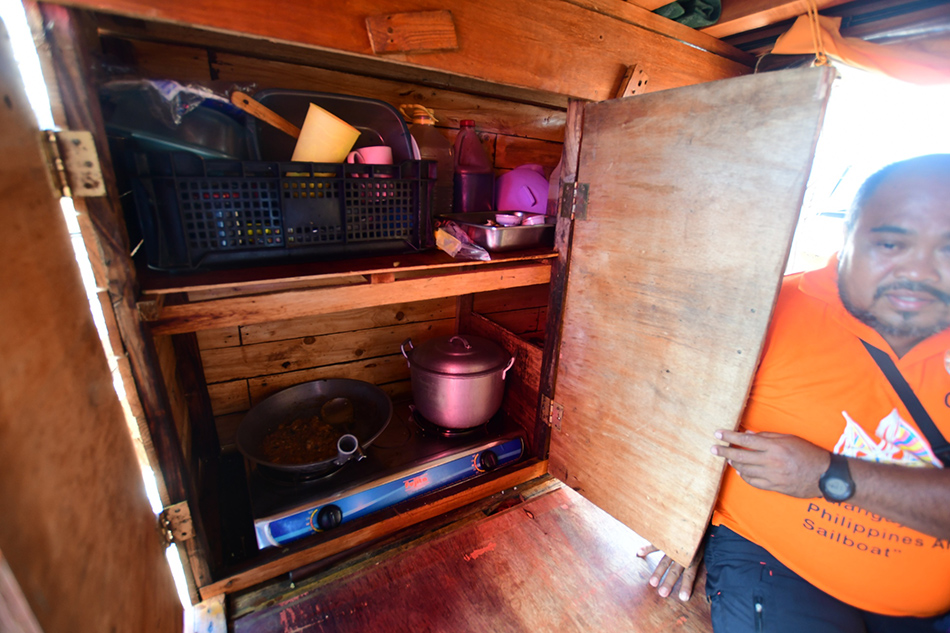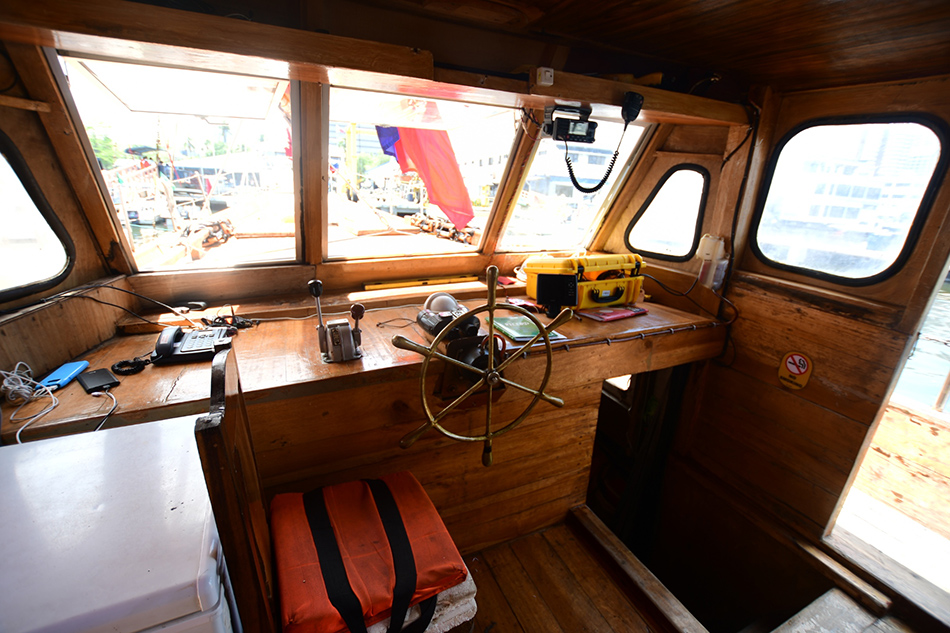LOOK: The anatomy of a modern balangay | ABS-CBN
ADVERTISEMENT

Welcome, Kapamilya! We use cookies to improve your browsing experience. Continuing to use this site means you agree to our use of cookies. Tell me more!
LOOK: The anatomy of a modern balangay
LOOK: The anatomy of a modern balangay
Katrina Domingo,
ABS-CBN News
Published May 22, 2018 06:20 PM PHT
MANILA -- Three ships designed to look like vessels used by Filipino seafarers long before the arrival of Spanish colonizers docked at the Manila Yacht Club after completing a 22-day expedition to Xiamen, China.
MANILA -- Three ships designed to look like vessels used by Filipino seafarers long before the arrival of Spanish colonizers docked at the Manila Yacht Club after completing a 22-day expedition to Xiamen, China.
The balangays, named Lahing Maharlika, Samang Tawi-tawi and Sultan Sin Sulu, were crafted by eight members of the Sama tribe in Sulu for about two to three months, according to PO1st Jeffrey Zaragosa, one of the Philippine Balangay Expedition Team’s enginemen.
The balangays, named Lahing Maharlika, Samang Tawi-tawi and Sultan Sin Sulu, were crafted by eight members of the Sama tribe in Sulu for about two to three months, according to PO1st Jeffrey Zaragosa, one of the Philippine Balangay Expedition Team’s enginemen.
The vessels that survived the rough winds and waves of the South China Sea were made from different types of timber endemic to the Philippines.
The vessels that survived the rough winds and waves of the South China Sea were made from different types of timber endemic to the Philippines.
Dungon, one of the ironwoods in the country, was used for the boats’ keels. Its hulls were made of yakal, while its decks were made of red lawaan, said Zaragosa, who oversaw the building of the boats.
Dungon, one of the ironwoods in the country, was used for the boats’ keels. Its hulls were made of yakal, while its decks were made of red lawaan, said Zaragosa, who oversaw the building of the boats.
ADVERTISEMENT
Each balangay costs about P2.5 million for the body alone and another P500,000 if it will be retrofitted with an engine, he added.
Each balangay costs about P2.5 million for the body alone and another P500,000 if it will be retrofitted with an engine, he added.
Motor-powered balangays
The Sultan is a replica of a traditional balangay. The Samang Tawi-tawi is powered by a 250-horsepower engine, while the Lahing Maharlika has a 130-horsepower motor.
The Sultan is a replica of a traditional balangay. The Samang Tawi-tawi is powered by a 250-horsepower engine, while the Lahing Maharlika has a 130-horsepower motor.
The two larger ships were also equipped with GPS, radios, and steering wheels.
The two larger ships were also equipped with GPS, radios, and steering wheels.
“We needed engines because we had to communicate with modern ports. Kung wala lang mga modern ports, we dont need engines,” expedition leader Arturo Valdez said.
“We needed engines because we had to communicate with modern ports. Kung wala lang mga modern ports, we dont need engines,” expedition leader Arturo Valdez said.
The balangays are capable of carrying 2,000 to 5,000 liters of fuel, Zaragosa said.
The balangays are capable of carrying 2,000 to 5,000 liters of fuel, Zaragosa said.
“The Maharlika consumed about 3,000 liters for the roundtrip journey. The Tawi-tawi consumed more because it had a bigger engine,” he noted.
“The Maharlika consumed about 3,000 liters for the roundtrip journey. The Tawi-tawi consumed more because it had a bigger engine,” he noted.
The Sultan Sin Sulu was pulled by the Samang Tawi-tawi, while the Lahing Maharlika escorted the two other vessels.
The Sultan Sin Sulu was pulled by the Samang Tawi-tawi, while the Lahing Maharlika escorted the two other vessels.
Temporary home
The balangays were manned by a 34-member crew composed of members of the Coast Guard and volunteer civilians.
The balangays were manned by a 34-member crew composed of members of the Coast Guard and volunteer civilians.
For nearly half a month, they lived in makeshift quarters beneath the balangay’s colorful sails.
For nearly half a month, they lived in makeshift quarters beneath the balangay’s colorful sails.
Each balangay had a supply of two sacks of rice, 15 gallons of drinking water, and canned goods.
Each balangay had a supply of two sacks of rice, 15 gallons of drinking water, and canned goods.
“Meron kaming kitchen so dito namin niluluto ang mga huli namin o kaya 'pag walang huli, may mga baon kaming de lata,” Zaragosa said as he pointed to stoves and cookware stashed in wooden shelves.
“Meron kaming kitchen so dito namin niluluto ang mga huli namin o kaya 'pag walang huli, may mga baon kaming de lata,” Zaragosa said as he pointed to stoves and cookware stashed in wooden shelves.
The crew washed their plates and clothes with salt water while the sea served as their toilets and bathing areas.
The crew washed their plates and clothes with salt water while the sea served as their toilets and bathing areas.
Here’s a look at the modern balangays that successfully sailed to China and back to the Philippines to renew centuries-old ties between the two countries.
Here’s a look at the modern balangays that successfully sailed to China and back to the Philippines to renew centuries-old ties between the two countries.
ADVERTISEMENT
ADVERTISEMENT








